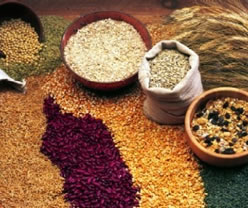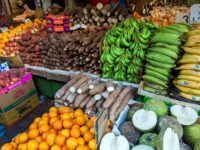 Ghana is to face a ban from exporting commodities like groundnuts, peanuts butter and cereal products to the European market if it is unable to reduce the level of aflatoxin contamination in such commodities.
Ghana is to face a ban from exporting commodities like groundnuts, peanuts butter and cereal products to the European market if it is unable to reduce the level of aflatoxin contamination in such commodities.
Aflatoxin is a toxin produced by a fungus growing on crops which cause liver disease.
Madam Mariella Sandini, team leader of the Trade Related Assistance and Quality Programme of the EU who announced this, said the high rate of aflatoxin contamination in groundnuts reduced the quality of the product in the international market.
She said this at a capacity building workshop for groundnut farmers and processors at Techiman in the Brong Ahafo Region yesterday.
The programme, organised by the Ghana Export Promotion with sponsorship from the European Union, was aimed at building the capacity of the participants to reduce the level of aflatoxin contamination of the products to meet EU technical regulations and standards.
Addressing the participants at the function, the General Manager of the Ghana Export Promotion Authority, Mr Stephen Normeshie, announced that the government had targeted $5 billion from the sector in the next four years.
He said in 2013, the non-traditional exports earning contributed $2.4 billion, out of which groundnut exports amounted to $6.4 million, a situation needing improvement.
“Groundnuts in Ghana have a high potential to contribute immensely to the non-traditional export sector in the near future and economic development of Ghana,” Mr. Normeshie said.
He said the programme was targeted at 20 districts in four regions, namely Brong Ahafo, Upper East, Northern and Upper West.
Mr. Normeshie said about 2,000 stakeholders in the groundnuts value chain on good agriculture practices with emphasis on prevention and controlling of the disease to benefit from the programme.
The Ghana Export Promotion Authority, he said, believed that preventing and controlling fungus contamination had the tendency of enhancing the quality groundnuts and cereals exported to the international market, adding “this will make it possible to utilize the rich and abundant groundnuts and cereal export resource potential available in the country”.
Groundnuts production in African countries, he said, fluctuated greatly though it never exceeded eight percent of the world output over the decade. Yields per hectare are low because of factors such as unreliable rains, non-reliable cultures, small-scale production traditional farming with little mechanization among others contribute to the situation.





